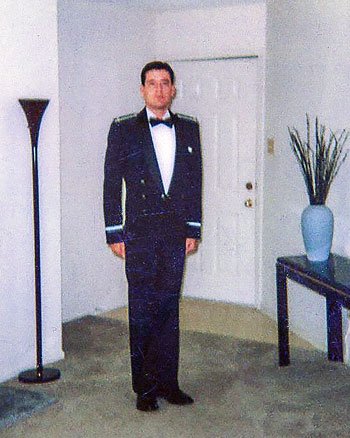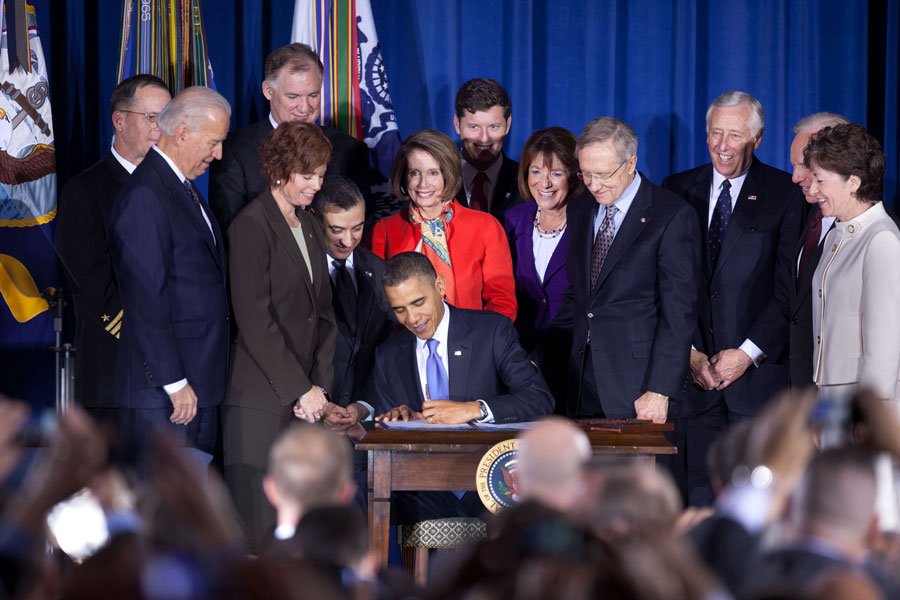Months After Biden’s Promise to Pardon Thousands of LGBTQ Veterans, Only 8 Have Applied Advocates say the confines are too narrow and the process too cumbersome, dashing hopes that the president’s act of clemency would erase decades of stigma
The White House claimed that “thousands” of veterans could benefit when President Biden announced this summer he was issuing pardons to gay veterans who were forced out of the military because of their sexual orientation “and have carried the burden of this great injustice for decades.”
But three months later, only eight veterans have applied for pardons—six from the Air Force, two from the Army, and none from the Coast Guard, Navy, or Marines.
The dismally low numbers are disappointing advocates who say the promise of Biden’s pardons raised hopes that thousands of LGBTQ veterans would not only lose the stigma of courts-martial but also qualify for long-denied veterans benefits.
The War Horse discovered only eight veterans have applied for pardons since Biden’s June 26 announcement after reaching out over the last two weeks to each branch of the military. The White House did not respond to questions about the lack of applicants or whether it was doing anything more to promote the pardons.
Steve Marose, an Air Force veteran who lives in Seattle, is among the eight who’ve applied, and his case is still under review.

Steve Marose poses in his Air Force mess dress uniform before heading to a formal event. (Photo courtesy of Steve Marose)
Marose said he was shocked by the response and wondered if the pardons’ limitations have discouraged other veterans. Only those convicted in a military court of consensual sodomy qualify, but experts say many LGBTQ veterans were forced from the military for decades simply under the threat of a court-martial.
“It sounds like it’s very broad, that thousands of people will be positively impacted,” Marose says. “When you look under the hood,” he said, it seems doubtful that such a large number of veterans will benefit.
Marose was convicted in 1990 of two counts of conduct unbecoming an officer in addition to three counts of consensual sodomy, so he is worried he may not receive a full pardon but decided to submit an application anyway.
His case is not unique. As The War Horse has reported, gay service members who wound up in a military court often faced other charges, including misconduct or conduct unbecoming, putting their eligibility for the pardon in question.
Michael Wishnie, a professor at Yale Law School and veteran law expert, was also surprised to learn that so few have jumped at the opportunity to apply for a pardon.
“It’s early, but these numbers are disappointing,” he told The War Horse.
Neither the Biden administration nor the Department of Defense could tell The War Horse how they came up with the claim that “thousands” of veterans would be eligible.
In July, The War Horse submitted a Freedom of Information Act request for Defense Department memos or reports that informed the White House that thousands of veterans would benefit from Biden’s act of clemency. However, the agency denied the request, saying the documents were part of the decision-making process, and therefore protected.
This week, The War Horse is filing a lawsuit to compel each branch of the military to turn over court-martial records that will help determine how many service members were convicted for consensual sex or other charges that criminalized their sexual orientation.
Award-Winning Journalism in Your Inbox
“Hopefully this lawsuit will make it easier for thousands of service members to receive some measure of recognition for how they were unfairly treated … and also allow the public to fully appreciate the scale of this injustice,” said attorney Joel Richert, an associate with Davis Wright Tremaine, a law firm that represents The War Horse.
The Department of Defense had no comment about the lawsuit.
Wishnie and other attorneys familiar with the military justice system believe that some veterans have likely found the pardon process too cumbersome. Veterans must gather documents related to their conviction, and submit a personal statement of why a pardon is being sought. If a pardon is granted, there’s also an entirely separate process for upgrading dishonorable discharges and earning VA eligibility for benefits including health care.
The pardon Biden issued this past summer is known as a “mass” pardon, meaning individuals aren’t named. That places the onus on veterans to work out whether they’re eligible and then commit to the application process.
Wishnie and other advocates say the Defense Department should take the lead in identifying veterans who were harmed and automatically upgrade their discharges. Until then, he said, little progress will be made in the effort to rectify the harms of past anti-LGBTQ policies.
“Rather than do the work itself to correct the Pentagon’s wrongdoing, the administration put the burden on veterans to prepare lengthy applications,” Wishnie said. “These low figures are the natural and foreseeable result of that choice.”
A Defense Department official told The War Horse that it isn’t practical to notify every person who is eligible for a pardon. Because the pardon period spans 60 years—from the end of World War II up until the repeal of “don’t ask, don’t tell” in 2011—a majority of the court-martial records are not digital, meaning thousands of cases would have to be reviewed one by one. Instead, the same official said, veterans who think they may be eligible are encouraged to apply.
This week, The War Horse is filing a lawsuit to compel each branch of the military to turn over court-martial records that will help determine how many service members were convicted for consensual sex or other charges that criminalized their sexual orientation.
In 2013, a House bill to upgrade discharge records for LGBTQ troops indicated that between the end of World War II and the repeal of “don’t ask, don’t tell,” about 114,000 service members were involuntarily separated based on sexual orientation.
A class action lawsuit filed last year in the Northern District of California found more than 29,000 service members were booted between 1980 and 2011 without receiving an honorable discharge due to real or perceived homosexuality or sexual perversion. That case seeks automatic discharge upgrades for gay veterans forced to leave the military.
Many of those like Army veteran Mona McGuire won’t qualify for the pardons. Earlier this year, The War Horse told the story of McGuire, a military police officer who in 1988, at the age of 20, was outed by a fellow soldier, taken into custody and told she either had to accept an other than honorable discharge or face a court-martial and possibly prison. She chose the less than honorable discharge in lieu of court-martial and gave up VA benefits and her dream of a career in the Army.
Without an actual court-martial, she doesn’t qualify for Biden’s pardons.
There is still hope for some veterans who are not eligible.
Last September, the Defense Department announced it would proactively review about 2,000 military records of service members who served during the “don’t ask, don’t tell” era and whose sexual orientation resulted in a separation. An update to this effort is expected sometime this fall. But it appears that too won’t help McGuire or Marose, who were discharged before “don’t ask, don’t tell,” a 1993 policy that forced gay service members to stay quiet about their sexual orientation or face punishment.

President Barack Obama signed the repeal of “don’t ask, don’t tell” in December 2010. (Photo provided by The White House)
In 1990, Marose, a former Air Force second lieutenant, was sent to federal prison at Fort Leavenworth for 18 months following his convictions for consensual same-sex relationships and sharing an apartment with a fellow airman.
Marose is pursuing every possible path to clear his record and access VA benefits. Along with his pardon application, he’s appealed his case directly to an Air Force Board for Correction of Military Records, which can’t forgive his convictions but can upgrade his dishonorable discharge. He’s also made his case directly to the VA, which has become increasingly accepting of veterans who did not separate from the military with spotless records.
Our Journalism Depends on Your Support
More than 30 years after Marose was kicked out of the military for his sexual orientation, he understands why some LGBTQ veterans are not up for the lengthy process that may only lead to frustration or disappointment. And there is also the added question about who will be in the White House in the fall and how that could impact the pardon process.
“I have a lot of balls in the air, and I was hoping something would land,” Marose says, “but instead I feel like I’m constantly having to argue and defend and hope and pray.”
This War Horse investigation was reported by Anne Marshall-Chalmers, edited by Mike Frankel, fact-checked by Jess Rohan, and copy-edited by Mitchell Hansen-Dewar. Abbie Bennett wrote the headlines.





Comments are closed.